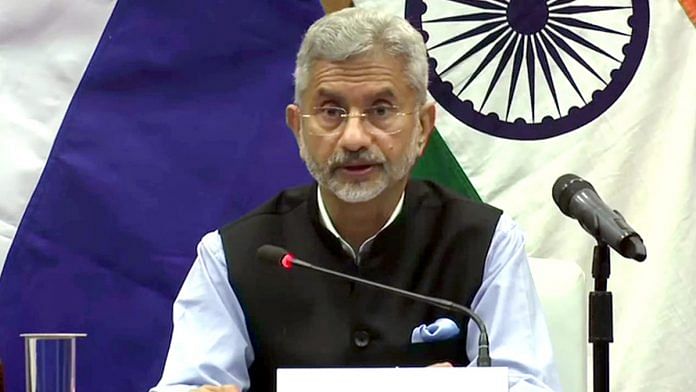
New Delhi: The Quad, or the Quadrilateral Security Dialogue, is not an “Asian NATO” and India never had a “NATO mentality”, External Affairs Minister S. Jaishankar said Tuesday even as he stressed that in the changing global order, like-minded countries are coming together to form coalitions.
The minister made the comments at the Raisina Dialogue, where he spoke along with Jean-Yves Le Drian, Minister for Europe and Foreign Affairs of France, and Marise Payne, Minister for Foreign Affairs of Australia.
Jaishankar said the Indo-Pacific strategic construct is not about reinforcing the Cold War era but to “overcome” it.
“The idea that when we come together and there is some sort of a threat or messaging to others, I think people need to get over this… This kind of using words like ‘Asian NATO’ etc is a mind-game which people are playing,” Jaishankar said.
“I can’t have other people have a veto about what am going to discuss, with whom I’m going to discuss, how much I’m going to contribute to the world. That’s my national choice. That kind of NATO mentality has never been India’s. If it has been there in Asia before I think it’s in other countries and regions, not in mine,” he added.
After the Quad got revived in 2017, and now since the first-ever summit of the Quad countries — India, Japan, Australia and the US — many commentators have referred to the Quad as the ‘Asian NATO’.
However, denying that the Quad is a security alliance, or an “Asian NATO”, Jaishankar said the grouping has dealt with 10 broad subjects so far — vaccine collaboration, higher education and student mobility, climate action, HADR (high availability disease recovery), emerging technology, resilient supply chains, semiconductors, disinformation, counterterrorism and maritime security.
“That list will tell you what is in our minds and what is the purpose of what we are trying to do… So the purpose of coming together is actually to find ways of working for our national benefit, for our regional benefit and for global benefit,” he said.
‘Indo-Pacific not about reinforcing Cold War’
In an effort to reiterate India’s focus on the Indo-Pacific strategic construct, Jaishankar said, “Indo-Pacific is a return to history. It reflects a more contemporary world. It is actually overcoming the Cold War, not reinforcing it.”
As the world is changing, India is now also forming coalitions with other like-minded countries with which it can “work together” and it is so because multilateralism “is not delivering the way it used to”, he said.
“There’s a vacuum which has emerged where multilateral has fallen short. Powers are not what they used to be, bilateral delivery is not what it used to be, so it requires countries which are comfortable with each other, who see merit in working with each other and who will make the world a better place by working together, come together,” he said.
“So, the world is moving towards groups of countries who are looking to work together… Pick your region, pick your combination, but I think that’s where the world is moving,” he added.
Historically, India used to see Indo-Pacific as Indian Ocean and Asia-Pacific. But today, due to globalisation, rebalancing of power and multipolarity “coming together” of countries have taken place, he said.
‘Willingness to work together’
Speaking at the event, French FM Le Drian said, “We share the same willingness to work together simply because we get along well and not just because we share some common interests or concerns, but because we are democracies and because we comply with the rule of law. On top of it we want to do it together.”
The French FM also added that the security in the Indo-Pacific region is very important.
According to Payne, Australia has a practical approach towards Indo-Pacific, and the Covid pandemic has made stronger democracies come together.
India, France and Australia are planning to launch a trilateral dialogue soon.
Subscribe to our channels on YouTube & Telegram
Why news media is in crisis & How you can fix it
India needs free, fair, non-hyphenated and questioning journalism even more as it faces multiple crises.
But the news media is in a crisis of its own. There have been brutal layoffs and pay-cuts. The best of journalism is shrinking, yielding to crude prime-time spectacle.
ThePrint has the finest young reporters, columnists and editors working for it. Sustaining journalism of this quality needs smart and thinking people like you to pay for it. Whether you live in India or overseas, you can do it here.